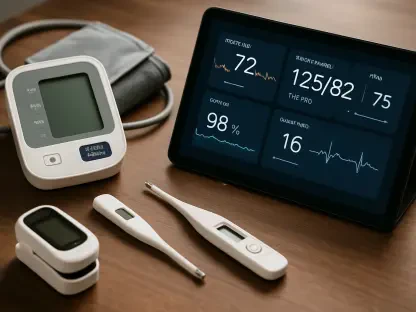As healthcare systems worldwide endeavor to overcome the increasing demand for efficient and affordable services, advanced digital solutions like eHealth 2.0 offer a promising path forward. Central to this advancement are technologies that harness the Internet of Things (IoT), artificial intelligence (AI), big data, and cloud computing. These systems have transformed the very fabric of healthcare delivery, positioning eHealth 2.0 as a pivotal component in revolutionizing how healthcare is accessed and managed across different regions. By capitalizing on the benefits of these technologies, eHealth 2.0 aims to enhance patient outcomes, streamline operations for healthcare providers, and reduce costs for insurers—in a potentially game-changing shift for all stakeholders involved.
Market Dynamics and Regional Variations
The growth trajectory of the eHealth 2.0 market is stimulated by several critical dynamics, setting the stage for innovative healthcare delivery across the globe. As of now, the market’s valuation stands at USD 347.54 billion and is poised to reach USD 879.55 billion by 2034, reflecting an impressive CAGR of 9.73%. Factors fueling this growth include a rise in the prevalence of chronic illnesses, advancements in technology, and increased demand for personalized healthcare services. Conversely, certain challenges impede progress, such as the shortage of skilled professionals, data security concerns, and lack of comprehensive reimbursement policies.
Regionally, the adherence to eHealth technologies reveals a complex landscape. North America, noted for its early adoption, leads the market owing to a robust healthcare infrastructure and supportive policies. Europe is experiencing substantial growth, driven by significant governmental investments in digital health services. Meanwhile, Asia Pacific’s rapid embrace of eHealth solutions signifies a transformative shift, bolstered by government support and heightened awareness. These regional distinctions highlight the nuanced dynamics of the eHealth 2.0 market, each contributing uniquely to its unfolding narrative.
Key Advancements in Technology
At the heart of the eHealth 2.0 evolution are remarkable technological innovations that promise to redefine healthcare service delivery in profound ways. Telemedicine has emerged as a dominant segment, enabling seamless healthcare access across geographical hurdles and enhancing care for chronic conditions. This convenience heralds a new era of healthcare where services can be rendered without traditional constraints. Meanwhile, Electronic Health Records (EHRs) are playing a pivotal role in accelerating healthcare digitization, streamlining patient data management, and enabling better decision-making.
Patient monitoring technologies have gained prominence, with eHealth applications supporting real-time remote monitoring, thereby improving chronic disease management and potentially saving lives with swift interventions. Similarly, AI-driven diagnostic tools are pushing the envelope in early disease detection, enabling timely interventions and fostering innovative applications. These advancements not only signify a leap in technological capability but emphasize the critical aspects of personalized and efficient healthcare delivery that eHealth 2.0 seeks to champion.
Opportunities and Challenges for Stakeholders
Conceptualizing eHealth 2.0 involves a deep dive into its dual nature of opportunities paired with formidable challenges. On the opportunity front, emerging trends like telemedicine 2.0 are expanding patient-centered care across barriers that once seemed insurmountable. Remote monitoring capabilities, empowered by advanced communication systems, offer healthcare providers an unprecedented level of insight into patient health, paving the way for more targeted and effective care strategies. Government initiatives aimed at modernizing healthcare systems further underpin the market, presenting substantial prospects for investment returns.
However, the path is not without its hurdles. A significant impediment remains the shortage of skilled personnel adept at harnessing these sophisticated technologies—particularly evident in regions with underdeveloped healthcare systems. Data security issues also pose a stark challenge, necessitating robust strategies to safeguard sensitive information integral to patient care. Moreover, the absence of universal reimbursement frameworks for eHealth solutions further complicates widespread adoption, posing a critical barrier that stakeholders must address to fully realize the technology’s transformative potential.
Role of Artificial Intelligence (AI) in Healthcare
Artificial Intelligence stands as a cornerstone of the eHealth 2.0 domain, offering transformative capabilities that fundamentally alter patient care. AI technologies facilitate precise remote patient monitoring, predictive diagnostics, and automated interactions through virtual assistants, enhancing patient engagement with healthcare systems. These innovations streamline healthcare delivery, mitigate service delays, and bolster decision-making processes. AI’s ability to provide personalized and data-driven healthcare solutions significantly enhances patient outcomes.
This wave of AI-driven technologies is not just an enhancement but a transformation of healthcare ecosystems—enabling providers to offer tailored care with remarkable efficiency. As AI continues to evolve, its integration within eHealth 2.0 is likely to expand, offering deeper insights into healthcare processes while optimizing service delivery. This alignment of AI with healthcare operations is pivotal in creating a system where healthcare is not only more personalized but also seamlessly efficient, marking a significant leap forward for the industry.
Emerging Market Segments and Industry Players
The segmentation of the eHealth 2.0 market unveils distinct and emerging areas of interest set to shape the future of healthcare delivery. Telemedicine takes the lead with its ability to transcend traditional healthcare boundaries while offering cost-effective solutions to both patients and providers. EHRs continue their vital role in digitizing records, easing patient data handling, and accelerating clinical decision-making processes. Monitoring services continue to expand due to an increased need for remote patient care, and the diagnostics segment is poised for rapid growth as early disease detection becomes a priority.
The industry is bolstered by key players such as Athenahealth Inc., Medtronic, and Siemens Healthineers, whose innovative strides in eHealth 2.0 shape the market’s trajectory. Through product innovation and strategic collaborations, these entities inspire industry-wide adoption of digital health solutions. Their contributions underscore the market’s potential to revolutionize healthcare delivery, catalyzing a shift towards more efficient and patient-focused healthcare systems.
A Transformative Force in Global Healthcare
As healthcare systems across the globe grapple with the rising demand for efficient and cost-effective services, the emergence of advanced digital solutions like eHealth 2.0 presents a promising way forward. At the heart of this development are cutting-edge technologies such as the Internet of Things (IoT), artificial intelligence (AI), big data, and cloud computing. These innovations have fundamentally altered the landscape of healthcare delivery, establishing eHealth 2.0 as a crucial element in reshaping how healthcare is accessed and managed across various regions.
The integration of IoT devices facilitates real-time monitoring of patient health, offering healthcare providers timely insights that can lead to improved care and prevention measures. AI algorithms assist in diagnosing diseases early and personalizing treatment plans, thereby enhancing patient outcomes. Additionally, big data analytics help in identifying trends and making informed decisions, while cloud computing ensures that all this data is stored securely yet remains accessible to authorized professionals.
By leveraging these technological advancements, eHealth 2.0 aspires to uplift the quality of healthcare services while simultaneously reducing operational burdens on providers and cutting costs for insurers. This shift holds the potential to enact transformative changes for all stakeholders involved, paving the way for a more efficient, accessible, and affordable healthcare system worldwide.









